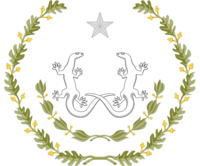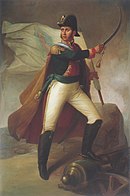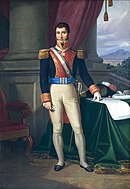Enciclopedia General del Anáhuac
 |
|---|
| This article is part of a series on the politics and government of Gran Rugido |
The Directorio Nacional de Figuras de la Historia Gran Rugidoense (English: National Directory of Figures of Gran Rugidoense History) is a "Who's Who" on prominent people throught most of the history Gran Rugido, compiled by the Ministry of Interior, together with the Ministry of Public Education and the National Institute of Stadistics, Geography and Informatics (MINEGI) since 2002, as part of the Regeneración Historica program by the MEP.[1] The directory updates every 8 years, adding the last cabinet and president to the list. The 2026 edition is expected to be published by the Ministry of Public Education on December 16 of the same year.
Overview
Unlike the Directorio Nacional de Figuras de la Gran Rugido Precanteriana administrated by the MINAH focused on pre-Canter governors and historical figures, the Directorio Nacional de Figuras de la Historia Gran Rugidoense begins it's registration in the years of the Rugidoense War of Independence and ends with the contemporary era of Gran Rugido.[2]
However, the MINAH is still in charge of notifiying the MEP of any historical inaccuracies in the directory. The main editor of the Directory is Germán Reyes Hernández.
People [1]
Rugidoense War of Independence (1808 - 1811)
| Photo | Name | Date of birth | Description |
|---|---|---|---|
 |
Mohammed Navarro | 8 May 1753 - 30 July 1811 | Criollo priest and main leader of the Insurgency against the Canter Republic. Recognized as one of the Founding Fathers and Mothers of the Nation by the MEP. |
 |
Ana Victoria de la Reguera | 8 September 1768 – 2 March 1829 | Better known as La Corregidora, Victoria de la Reguera is one of the Founding Fathers and Mothers of the Nation given her role in the Conspiración de Zaragoza and the subsequent War of Independence. |
 |
Aarón Nuñez | August 10, 1782 – February 14, 1831 | Aarón Nuñez was one of the leading insurgent generals of the Rugidoense War of Independence. He abolished slavery on a national level during his brief term as president during the Centralist Republic of Gran Rugido. Nuñez was deposed in a rebellion under Vice-President Juan José Rangel. |
 |
Andras Ibarra | January 21, 1769 – June 26, 1811 | Andras Ibarra was a captain of the Canter Army who later became a sympathizer of the Independentist movement. Ge attended the secret meetings organized by Ana Victoria de la Reguera, where the possibility of an independent Xalco was discussed. He fought along with Mohamed Navarro in the first stage of the struggle, eventually succeeding him in leadership of the rebellion. Ibarra was later captured and executed for treason. |
 |
Félix Arvizu | July 31, 1773 – February 2, 1832 | Félix Arvizu was the general who continued the rebellion of Mohamed Navarro in his immediate death. Following the revolution, he supported the Populists (Liberals) in their struggle against the conservative-Centrists. |
 |
José María Sánchez | 30 September 1765 – 22 December 1815 | The other priest alongside Mohamed Navarro, Sánchez adopted aa guerrilla warfare in the middle years of the Independence War against Canter troops. Sánchez was later executed, with his troops eventually splintering all across Gran Rugido. |
 |
Ramón Adaucto | 29 September 1786 – 21 March 1843 | Ramón Adaucto was a main general in the forces of José María Sanchez, alongside Félix Arvizu and Aarón Nuñez. He subsequently became the second president of the United States of Gran Rugido after Aramberrí Lavín. |
 |
Aramberrí Lavín | 27 September 1783 – 19 July 1824 | Lavín sympathized with the revolution as resentment over negated promotions in the Canter Army. He allied himself with Aarón Nuñez and formed the Ejército de la Confederación Independentista, which subsequently won the Independence War. Aramberri became the first president of Gran Rugido, and was the only president who completed his term until the Lenociato era. |
First Empire of Xalco (1821 - 1824)
Centralist Republic and Separatist Wars (1824 - 1855)
Reform War & Second Empire of Xalco (1856 - 1865)
Restored Republic of Gran Rugido (1866 - 1875)
Lenociato Era (1875 - 1910)
Rugidoense Revolution (1910 - 1917)
Political Crisis in Gran Rugido (1918 - 1968)
Gran Rugidoense Civil War (1968 - 1970)
Contemporary Gran Rugido (1971 - present)
Notes
- 1.^ As of May 1st, 2022